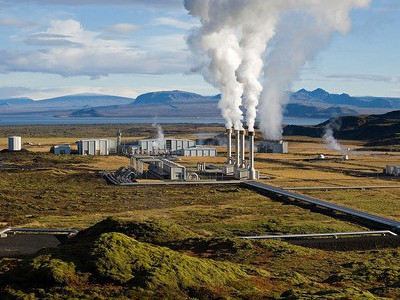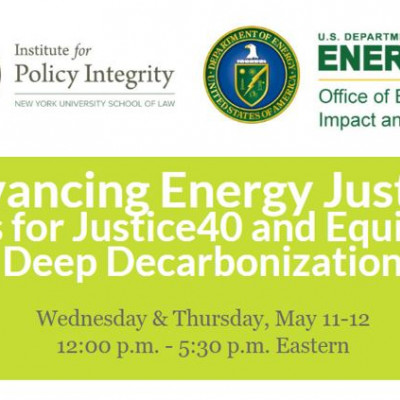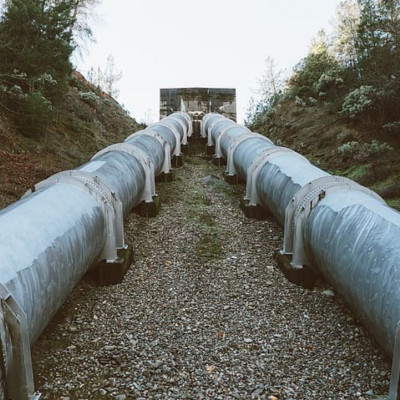April 30, 2022
April 2022 at Policy Integrity
- Mark Your Calendars: Conference on Justice 40 Research Tools
- New Report: The Emissions in the Kitchen
- Legal Scholars Agree: FERC Has Authority to Consider Climate in Pipeline Permitting
- Improving Climate Analysis in Agency Environmental Reviews Under NEPA
- Staff Spotlight: New Environmental Justice Director
- Recommendations for Carbon Capture, Utilization, and Sequestration
- Policy Integrity Insights: Environmental Review, Community Campaigns
- More From This Month
-
Mark Your Calendars: Conference on Justice 40 Research Tools
On May 11th and 12th, Policy Integrity and the Department of Energy will co-host a conference on Justice40—the Biden administration’s effort to deliver at least 40 percent of the benefits from federal climate investments to underserved communities. Federal agency staff working to implement Justice40 will join researchers to discuss how academic research can help the implementation while being more responsive to communities’ needs. Speakers and attendees will work to identify implementation challenges and opportunities for Justice40 and other energy justice initiatives. The goal is to enable researchers to develop methods, interdisciplinary connections, frameworks, and data sources that can help make deep decarbonization efforts more consistent with the tenets of energy justice. Register here for this free event. The schedule and session descriptions are available on the event page. The event is supported by the Alfred P. Sloan Foundation.
-
New Report: The Emissions in the Kitchen
Gas stoves are found in over a third of American homes and emit dangerous levels of nitrogen dioxide (NO2) and fine particulate matter (PM2.5) within just a few minutes of cooking. This indoor air pollution can cause asthma in children and exacerbate other serious conditions such as respiratory illness and cardiovascular problems. A new report by Laura Figueroa and Jack Lienke argues that the Consumer Product Safety Commission (CPSC) can and should take action to address the unreasonable health risks posed by gas stove emissions. The report recommends that the Commission: issue performance standards for gas stoves and range hoods that focus on increasing ventilation and alerting users to unsafe concentrations; require warning labels on gas stoves; and launch a public campaign to build consumer awareness about the dangers of gas stoves. "Something needs to be done. We know that [gas stoves] are dangerous. You can't just ignore it," Figueroa told Politico’s E&E News.
-
Legal Scholars Agree: FERC Has Authority to Consider Climate in Pipeline Permitting
The Federal Energy Regulatory Commission (FERC) recently released draft policy statements recognizing the importance of considering climate impacts in pipeline certificate proceedings. In response, opponents argued that the Commission lacks authority to consider climate effects in its oversight of natural gas infrastructure under the Natural Gas Act. A Policy Integrity comment letter signed by 30 environmental and administrative legal scholars refutes these claims, and explains why considering climate impacts in FERC’s pipeline certification is consistent with legislative design, regulatory precedent, and Supreme Court case law. A new blog post by Max Sarinsky outlines the key arguments.
-
Improving Climate Analysis in Agency Environmental Reviews Under NEPA
The Council on Environmental Quality (CEQ) plans to comprehensively revise its regulations that guide agencies’ review of federal actions under the National Environmental Policy Act (NEPA). CEQ has announced that its revised regulations will aim to “advance climate change mitigation and resilience,” among other priorities. In a new policy brief, Dena Adler and Max Sarinsky outline six simple revisions that CEQ should prioritize in its next phase of rulemaking to improve consideration of climate change impacts during environmental review. Adler summarizes these recommendations in this blog post.
Last month, the agency restored key features of the standards that had been removed during the Trump administration, prompting objections from industry groups. Speaking to Inside EPA, Sarinsky said he expects facial litigation over the Phase 1 rule, but noted challengers may face standing and ripeness hurdles.
-
Staff Spotlight: New Environmental Justice Director
Policy Integrity is excited to welcome Albert Huang as our first Environmental Justice Director, starting this summer. Huang directed the Natural Resources Defense Council’s environmental justice program for more than a decade and has extensive experience working with EJ communities on litigation and advocacy. Huang will oversee our environmental justice work, focusing on improving distributional analysis in regulatory policy. He has previously taught environmental justice law at NYU and Fordham law schools.
-
Recommendations for Carbon Capture, Utilization, and Sequestration
The White House Council on Environmental Quality (CEQ) recently released interim guidance on Carbon Capture, Utilization, and Sequestration (CCUS) to assist federal agencies with regulation, permitting, and associated activities. We filed comments urging CEQ to: encourage agencies to develop more transparent monitoring, reporting and verification (MRV) programs; advise agencies to focus their resources primarily on CCUS activities and projects with the greatest expected net benefits; encourage agencies to overtly prioritize community participation, environmental justice, and the generation of local net benefits; and advise agencies to address discrepancies in lifecycle analysis burdens for CCUS tax credits offered under Section 45Q of the Internal Revenue Code.
-

Policy Integrity Insights: Environmental Review, Community Campaigns
- The Ninth Circuit recently found that the Department of Interior's climate analysis for a major coal mining project was inadequate. Max Sarinsky explains what the ruling means for future analyses of proposed fossil-fuel projects throughout the federal government.
- How can low-budget community campaigns leverage regulatory complaints and comments? Anna Kasradze shares takeaways from the Critical Legal Empowerment conference hosted by NYU Law’s Bernstein Institute and Law Review.
-
More From This Month
We submitted comments to:
- FERC on improving its consideration of upstream and downstream emissions while reviewing proposed gas infrastructure, and urged the agency to apply these insights in its ongoing review of the proposed Regional Energy Access Expansion Project.
- EPA on its proposal to reaffirm the “appropriate-and-necessary” finding for regulating mercury and other toxic air pollution from power plants under Section 112 of the Clean Air Act. This proposal reaffirms the scientific, economic, and legal underpinnings of EPA’s 2012 Mercury and Air Toxics Standards (MATS). “By considering both direct and indirect benefits in this decision, EPA revives analytic best practices cast aside by the Trump administration,” Richard Revesz told Bloomberg Law.
- EPA on its proposed particulate matter standards for aircraft emissions.
- FERC on its decision to grant a certificate of public convenience and necessity to Iroquois Gas for its Enhancement by Compression Project.
Environmental Law published “Distributional Consequences and Regulatory Analysis” by Richard Revesz and Samantha Yi, which argues that agencies will need to take seriously the existing requirement of analyzing the distributional consequences of different regulatory alternatives to succeed at incorporating environmental justice into regulatory decisionmaking, where prior efforts failed.
Shi-Ling Hsu reviewed Reviving Rationality: Saving Cost-Benefit Analysis for the Sake of the Environment and Our Health by Michael Livermore and Richard Revesz for Michigan Law Review in a thoughtful piece on the future of cost-benefit analysis in regulatory policy.
This month, FERC announced its long-awaited Notice of Proposed Rulemaking (NOPR) on its reforms for transmission planning, project selection, and cost allocation. Justin Gundlach and Sarah Ladin highlight the key components of the 500-page document in this blog post. The proposal is “a modest but important step toward more efficient planning that can facilitate decarbonization,” Ladin told RTO Insider.






